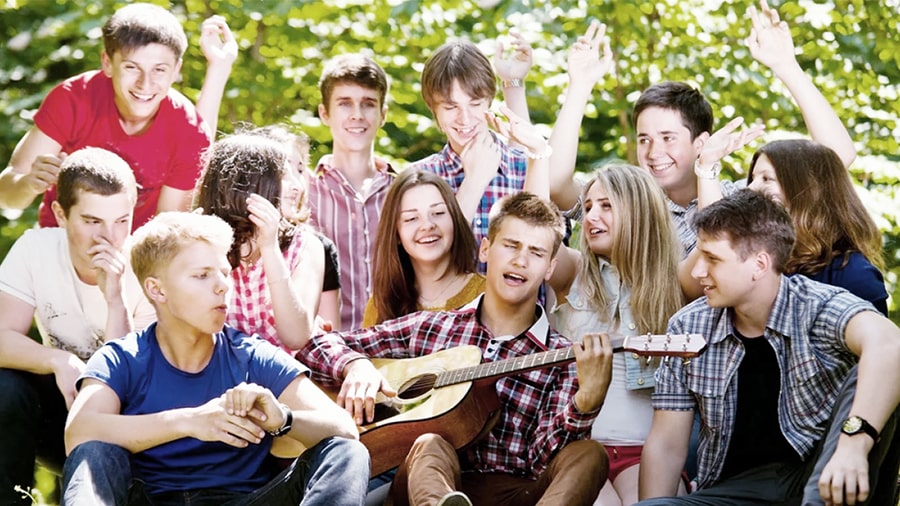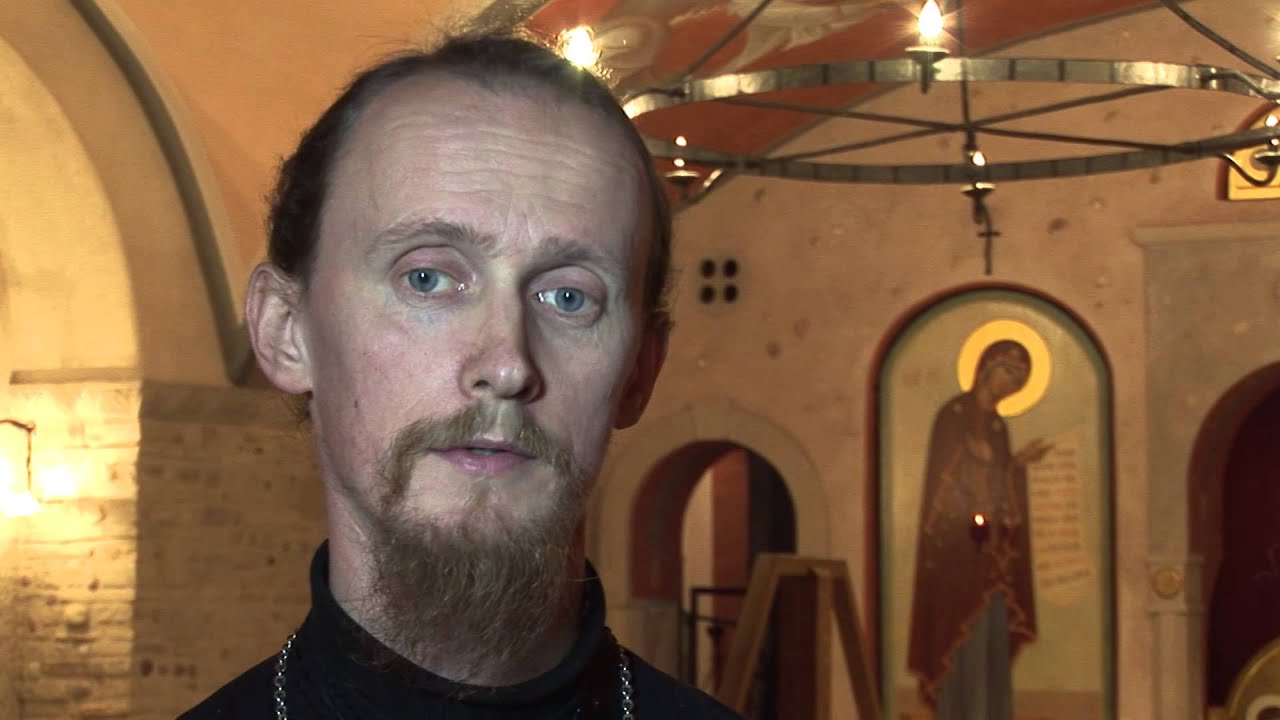
What is it that makes church life attractive to young people? What causes young men and women to travel all the way to the convent rather than sitting in front of their computers or spending their day resting after a long work week? Why are the Divine Liturgy, theological debates, and spending time with the disabled children at the boarding home more important to them than rest and entertainment? To find out what brings young people to church and why they find life in Christ to be the only way of living, we spent one Sunday with members of the convent's youth association in honour of the Holy Martyrs Faith, Hope, Love, and their mother Sofia.
It is 1.30 on a Sunday afternoon. Young people are gathering in the lobby of the convent's school "Ichthys". Some have been at the convent since early morning to attend the Divine Liturgy and take Holy Communion. Others come for the reading of the Akathist to the heavenly intercessors of the youth group: the Holy Martyrs Faith, Hope, Love, and their mother Sofia. The rest come for the theological discussion. Some go straight to the boarding home for disabled children.
The history of the convent's youth group has its roots in the Sunday school established at the Convent of Saint Elisabeth in 1998. As the children who attended the school grew, church members decided to create an environment to support their continued growth in faith, and the youth group became an extension of the Sunday school. The young people who remained in the group have grown into young adults but have continued to go to church and fulfil obediences in boarding homes and hospitals. Some have become monastics at the convent, and some are serving as priests.

Priest Rodion Alkhovik
Priest Rodion Alkhovik, Spiritual Father of the Sunday school: I am a former member of the convent's youth group, and I value that experience a lot. We are now less numerous than in our first years, and members have also become less active, but we have a strong core of young and responsible adults aged 25 - 30 years. Some of the others have gone to other parishes and churches, the number of which has been growing at a fast pace. On an average year, we welcome about 30 - 40 newcomers, but not all of them remain in the group. The group meets every Sunday throughout the year at Ichthys School. The meetings include the reading of the Akathist and the Scriptures. This is followed by a theological debate in which members try to examine the life around them through the lens of the Holy Scriptures.
However, the group's activity is not limited to this. It also includes charitable work in the community. The church provides a choice, and it is up to the young person to decide which path to take. An active member will not only live a life of sacrifice himself but will also help others. Everyone is free to choose. No one can be brought to faith against his or her will.
That faith without deeds is useless is a living truth for every active member of the group. For each of them, coming to God has brought the need to show their faith through their deeds by helping the needy. The members of the group are involved in helping children with mental disabilities. The young men and women spend time with the children and teens outside, and they draw, read stories, listen to music, and play games with them.
"The volunteers from the youth group are very welcome here. We always look forward to their visits", says Irina Davidovich, a medical nurse at the boarding home for children with disabilities. “The children here need love and the opportunity to communicate with others. Not all of them have parents who can visit them, and they receive every visitor as a loving family member. They are very kind-hearted, just like any other child who does not live in an institution.
They spend their whole day in a ward. Together with the young people, we move them from their beds to the wheelchair, take them outside, and take them to the auditorium to play. Even children with some of the most severe disabilities will respond to being called by name. They remember people, names, and voices, and discover the world in their own ways. They are kind-hearted, generous, and grateful. Some may not be able to talk but will smile in response. The visits help them become more joyful, lively and inspired, and they always look forward to the next meeting.
The volunteers are doing a great job. We, as health professionals, come here to work, but they spend their personal time on weekends and come to help the children without expecting anything in return. I take my hat off to them!”

As we came to understand during our interviews with the youth group members, they do not go to church for entertainment or to escape the difficulties of worldly life. Rather, they are motivated by the search for meaning and opposition to the aggressive, consumerist and pleasure-seeking attitudes to human relations They are also driven by the desire for companionship and their willingness to help people who are most in need.
The active search for truth starts when a young person realises at some stage in their life that sensual pleasures and abundance do not always bring happiness.
The leader of the Orthodox youth group Sergey Spasov remarks: "Our society is becoming ever more computerised. We are losing our communication skills. Sometimes, we do not even know how to talk to one another. Being a part of the youth group is highly valuable in this regard. Our work at the residential care facility is the practical cause, and our theological discussions are an attempt to form a community through dialogue.
Being a part of the youth group changed my perspective and brought led me to spiritual life. I can feel God's help in everything I do. Therefore, this is the place where I need to be so that I can grow and where I need to make a contribution.” The other phrases together have a somewhat different connotation. When I come here, I follow my heart's calling, although there are times when I have to force myself to come. At such times, my main incentive is my feeling of responsibility to my peers.
Vladimir Tsyplyatin: I was baptised three years ago. I had a lot of questions to which I could find no answer, like: ‘Why do I exist?’ and ‘What is the meaning of my life?’ At 22, I began to ask myself these questions very often. When a misfortune happened and things became very tough, God sent someone along who showed me the Scripture. I was baptised at 25. Some of my old friendships fell apart since our interests had diverted, but one of my friendships survived - my best friend was also baptised.
I saw a message on the notice board of one of the Convent's churches about the youth group’s meetings. I went to one of them and ended up in the youth group. We read and discuss the Scriptures, and in this way, we discover new meaning in our lives, look at ourselves from a different perspective, and learn to see ourselves for what we are, not for what we appear to be. Little by little, we come to the understanding that Truth can be found in Church. Today, I feel a genuine need for prayer, confession, and Communion. I have a desire to live with God.
When I started volunteering at the boarding home, I had not had many encounters with disabled people; I was barely aware of their existence. Through this experience, I have learned to value the simple things. Being in good health and having both arms and both legs are in fact Godsends. This can only be realised by meeting other people who are different.
Svetlana Zhuk:This is my first time here, and I think I will continue to visit. I work at the Ichthys School as a music teacher, pianist, and speech therapist. I used to sing in the hierarchical choir of Turov Eparchy. My parents are faithful Orthodox believers. My whole life since early childhood has been closely connected with my faith in Jesus, so joining the Orthodox youth group was a natural thing to do. I see my work at the Ichthys School as nothing less than Divine Providence.
Anton Spaskov: I have stopped going to the theological talks since I have already found the answers to my questions, but I still go to help the children every Sunday. Seeing the children's responses and their welcoming attitude is very rewarding. While there are many children who cannot speak well enough to say how they are feeling, their smiles, hugs, and body language speak volumes. I feel very privileged to be able to help them. Not all of the children have parents. Some do, but they come to visit them very rarely. I am not trying to be a parent to them, but I do realise that children need love and attention.
Anna Sinkevich: I first went to an Orthodox youth group in Vitebsk. We volunteered at a residential institution, helped the Convent of the Holy Spirit, and went on multiple missionary trips. Christians need to practice their faith in their works. It is also important to be among like-minded people and work together. When I came to Minsk, I met a friend from the youth group back in Vitebsk, and he brought me here. I think it was no accident. As our Matushka used to say, "Where else would you go to church, after having spent time at a monastery? The monastery, of course!"
I have been going to Church for over a decade. I came here on my own. My grandmother was a believer. My parents are not churchgoers. I have enjoyed volunteering since university. My mother welcomed my involvement in a social cause because it was keeping me busy, but her attitude changed when she learned that I was going to church and doing obediences at a monastery. Perhaps she would have been less worried if I had been going to a regular church, but the idea of me going to a monastery seemed intimidating to her. She was afraid that I would be exploited. She would make her point quite harshly at times. My father was quite relaxed and so was my aunt.
Sergey Beresnev: I have been volunteering at the institution for several years. At one stage in my life, I was feeling very sad and pessimistic. I went for a confession, and the priest said to me, 'Why don't you try volunteering with the children?' That is how I ended up here. It has really changed my life, and each Sunday night, I feel very rewarded and full of energy. Being with the children is very refreshing and makes you forget all your sorrows. The children look forward to your visit. They smile and enjoy your companionship. Being with them is a great joy. I go back to work on Mondays well-rested.
As I was interviewing members of the Orthodox youth group, I recalled on multiple occasions the famous maxim by Dostoyevsky that beauty will save the world. What he had in mind was not some nice-looking external appearance but rather the inner beauty of a generous, humble, and compassionate human being who notices and responds to other people's sorrows. The truth of this observation from the Russian classic came out very vividly throughout the interviews.